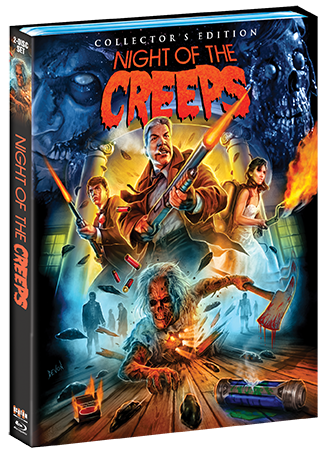Home Video Hovel: Night of the Creeps, by Tyler Smith

They say that imitation is the sincerest form of flattery. If that is the case, then there are a number of filmmakers who should be deeply flattered by Fred Dekker’s Night of the Creeps. Released to very little fanfare in 1986, Dekker’s horror comedy pays homage to many of the greats of the genre, also tipping its cap to the general tone of 1950s science fiction. While this is frequently to the film’s detriment – it often spends more time referencing memorable horror films than actually being one – the overall experience is enjoyable enough to recommend.
The story involves small, slug-like, parasitic aliens that burrow into their hosts’ brains and control their actions. Multiplying rapidly, the aliens attempt to take over an entire town, with only a handful of misfits able to stop them. These include college friends Chris (Jason Lively) and J.C. (Steve Marshall), and cynical police detective Ray Cameron (Tom Atkins). With their classmates turning into what are essentially zombies, our heroes must act quickly to keep what’s left of the town safe.
With the basic story already owing heavily to David Cronenberg’s Shivers and George Romero’s Night of the Living Dead (both directors are name-checked in the film), Night of the Creeps has its work cut out for it, both in executing the intense body horror found on both films and in trying to keep the story fresh for the audience. Dekker manages the former much better than the latter, as the events don’t strike us as particularly new, but instead a celebration of the genre that the intended audience is already so fond of.
There is nothing wrong with paying loving homage to film history. Plenty of filmmakers have built their careers on infusing their love of movies past with engaging stories and characters. But it’s a tightrope; go too far towards homage and you lose the sense of urgency required to keep the audience’s attention. That happens frequently in Night of the Creeps, as Dekker often seems too preoccupied incorporating as many horror references into the film as possible (a random character literally has the last name “Carpenter-Hooper”, which is such a ridiculous mouthful that I have to assume Dekker intended it to be obviously silly; perhaps a goof on over-eager film students).
As Dekker is clearly enjoying his film as a means of jubilant observance, it falls to the actors to carry the weight of the story itself, while actively incorporating the obvious tongue-in-cheek humor of the piece. Jason Lively is a solid enough leading man, but it is Steve Marshall that I found myself paying attention to. Stuck with the typical wiseguy best friend character, Marshall plays J.C. with more than a hint of real sadness. Being disabled, J.C. openly acknowledges his dependence on his best friend, through whom he can live vicariously. While we’ve seen characters like this before, they are seldom so tragic as J.C., and Marshall manages to be genuinely funny while also suggesting something much deeper under the cheery surface.
Then, of course, there’s Tom Atkins, who seems able to balance humor and commitment better than anyone else involved, including the director himself. As detective Cameron (another director name, for those keeping track), Atkins steers directly into the sheer movie-ness of the character, playing him with the kind of gleeful cynicism that can only be found in on-screen veteran detectives. Never has world-weariness been so fun!
Since its release, Night of the Creeps has become a cult film, and Fred Dekker a bit of a hero to horror fans. We can even see clear references to this film in later horror movies by like-minded directors, such as James Gunn’s Slither. Watching it so long after its release, it’s easy to see how it has captured the hearts of diehard horror fans. It is a gruesome, funny, and affectionate homage to the genre itself. If the film falls well short of greatness – which it does – it is due to the director’s inability to step outside himself as a horror fan and deliver a film that is effective on its own terms, rather than simply trading on the past greatness of the classics.





























